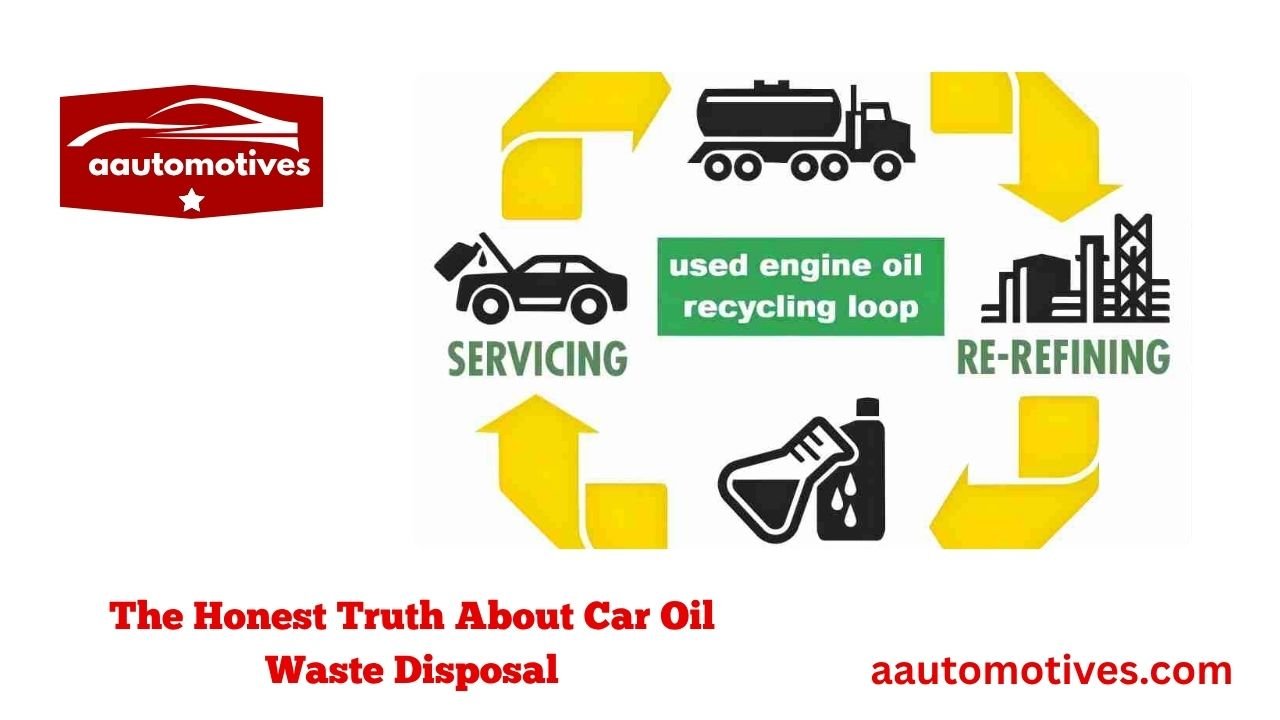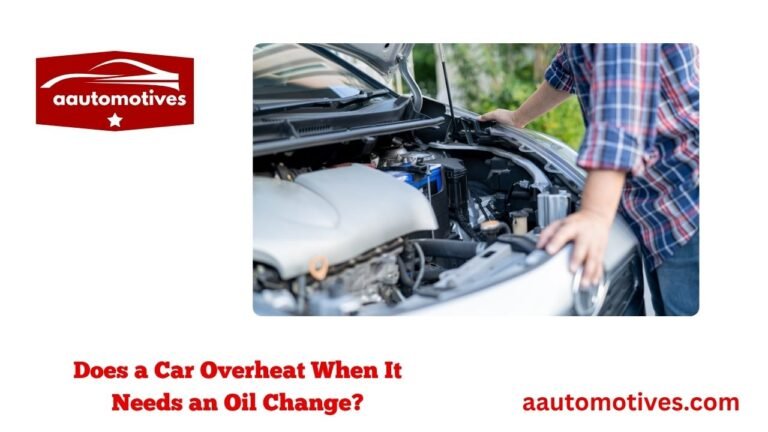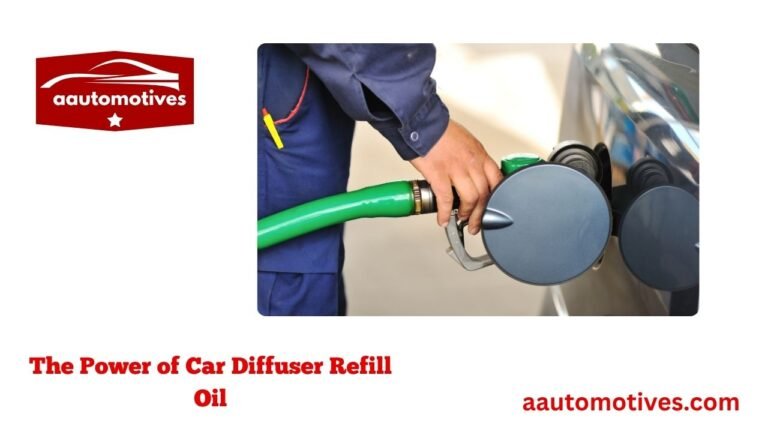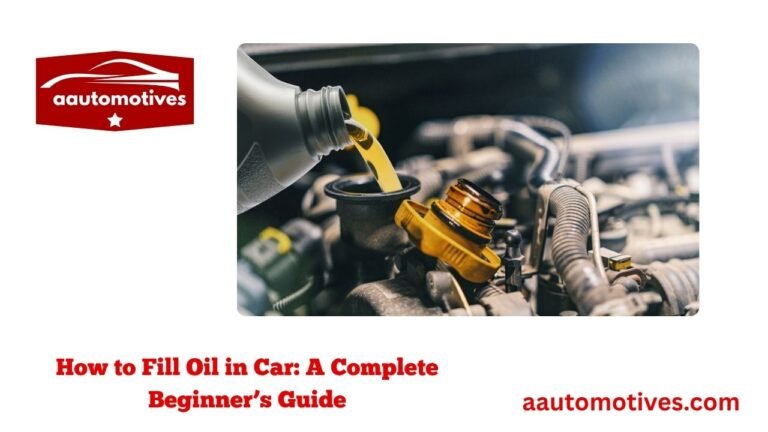The Honest Truth About Car Oil Waste Disposal

We’ve all been there—standing in the garage, dirty gloves in one hand and a used oil pan in the other, wondering: What now? Maybe you’ve just changed your car oil for the first time. Or maybe you’re like me, someone who once poured used oil into a soda bottle thinking, “I’ll figure it out later.” Spoiler: later never came. That bottle sat in the corner for weeks before I finally did some digging.
Car oil waste disposal might seem like a tiny part of car maintenance, but trust me—it’s huge. Improper disposal harms wildlife, pollutes water, and even affects our health. It’s not just a personal responsibility—it’s a global one.
In this guide, I’ll walk you through everything you need to know, from how oil affects the environment to how to safely dispose of it. I’ll also share some personal stories, sprinkle in research, and keep things simple, clear, and real.
How Used Motor Oil Harms the Environment
Used car oil doesn’t just disappear. It lingers. It leaks into the soil, contaminates rivers, and seeps into our water systems. One single gallon of used motor oil can pollute up to one million gallons of fresh water. That’s enough water for 50 people for an entire year.
When I was younger, I saw a neighbor pour oil down a storm drain. He thought it led to a treatment plant. But storm drains often lead straight to streams and lakes. That moment stayed with me.
Used oil contains heavy metals, sludge, and toxic chemicals that your engine filters out during use. That same protection your engine gets turns into a nightmare when dumped into the earth.
Here’s a breakdown of what happens when used oil isn’t disposed of properly:
| Harmful Component | Effect on Environment |
|---|---|
| Lead & Cadmium | Poison aquatic life |
| Hydrocarbons | Suffocate soil and marine plants |
| Sludge Particles | Clog water systems and drainage |
| PCBs & Toxins | Enter food chain, affect humans |
Proper car oil waste disposal isn’t just about cleaning up after yourself. It’s about protecting the people, animals, and environment around you.
Signs You’re Doing It Wrong (And How to Fix It)
I’ll be honest—I’ve made mistakes. Once, I left used oil in a container with no lid. Days later, the garage stank, the container leaked, and I realized I’d created a mini disaster. If you’re nodding in shame right now, you’re not alone.
Here are signs your oil disposal game needs work:
You store oil in old food containers (bad idea).
You pour oil down the drain or toilet (never do this).
You leave oil outside for “later.”
You throw it in the trash with the regular garbage.
Fixing it isn’t hard. You just need the right habits. Always use a sealed, labeled, and non-reactive container like a plastic jug with a screw top. Keep it in a cool, dry place away from kids or pets. Then, take it to a certified collection site.
Trust me, it feels great doing it right.
The Right Way: Step-by-Step Car Oil Waste Disposal
Let’s walk through it like we’re in the garage together.
Drain the Oil Properly
Use a drip pan.
Let it cool before handling.
Wear gloves—used oil is sticky and toxic.
Use a Clean Container
Don’t reuse soda bottles or milk jugs.
Use containers marked “used oil.”
Ensure it has a tight-fitting lid.
Label It Clearly
This isn’t just for you—it’s for the recycling center.
Write “USED OIL – DO NOT DUMP” on the label.
Store It Safely
Place it on a flat surface.
Keep away from heat or flames.
Transport to a Collection Center
Google “oil recycling near me” or check auto parts stores.
Many places accept up to 5 gallons for free.
Don’t Mix It
Never mix oil with antifreeze, paint, or chemicals.
Mixed fluids often can’t be recycled.
Recycle the Oil Filter Too
Drain it thoroughly.
Some places require it in a plastic bag.
Doing this might take an extra 15 minutes, but that’s less than the time you spend scrolling TikTok. And it makes a real difference.
Where to Take Your Used Oil (Options That Actually Work)
Finding where to dispose of your used oil isn’t as hard as it sounds. In fact, some places make it surprisingly easy.
Auto Parts Stores
Many stores like AutoZone, O’Reilly Auto Parts, and Advance Auto Parts accept used oil.
They usually have a bin at the back.
It’s free—and quick.
Local Government Facilities
Municipal waste centers often take used motor oil.
Some cities even offer curbside pickup.
Car Dealerships or Service Centers
Many will take your used oil if you ask.
Some might charge a small fee.
Community Recycling Events
Look out for “hazardous waste collection days.”
Great way to get rid of oil, paint, and batteries all at once.
Here’s a quick table to compare your options:
| Disposal Location | Cost | Oil Filter Accepted | Other Notes |
|---|---|---|---|
| Auto Parts Store | Free | Yes | Fast, easy, reliable |
| City Recycling Facility | Usually Free | Sometimes | Check their hours |
| Dealership | Sometimes Free | Yes | Call ahead to confirm |
| Curbside Pickup (Some Cities) | Free with limits | Maybe | Not widely available |
| Hazardous Waste Events | Free | Yes | Great for bulk household waste |
Why Recycling Used Motor Oil Really Matters
Here’s the cool part: used oil can be re-refined and used again. That means it’s not just waste—it’s a resource. When you recycle motor oil, you help reduce the need for new crude oil. It’s like giving your oil a second life.
One gallon of used oil can be re-refined into 2.5 quarts of fresh lubricating oil. That’s amazing! The re-refining process removes impurities and brings the oil back to near-new condition.
When I first learned this, I was blown away. It shifted my mindset from “get rid of it” to “reuse it.”
It’s also way more energy-efficient to recycle oil than to produce it from crude. According to the EPA, re-refining used oil takes less energy than refining crude oil—and produces fewer greenhouse gases.
Personal Story: The First Time I Disposed Oil the Right Way
I’ll never forget the first time I did a proper car oil waste disposal. It was a Sunday. I had just finished changing the oil on my 2009 Honda Civic. My hands were covered in grime, my shirt had oil splatters, and I felt proud.
Then came the used oil dilemma. This time, I did my research. I poured it into a clean, screw-top jug, labeled it, and drove to an AutoZone nearby. The guy at the counter gave me a nod and pointed to the bin. It was that easy.
I remember walking out of that store like I’d just saved the world. And in a small way—I had.
That’s the power of doing the small things right.
The Legal Side: Fines and Penalties for Improper Oil Disposal
Here’s something most people overlook: improper car oil waste disposal is illegal. You might think, “It’s just a small amount,” but the law doesn’t see it that way. Many states and countries have strict regulations in place—and for good reason.
Let me paint a picture. A guy I met at a local car meet bragged about dumping oil in the woods to “save time.” Months later, his fine was over $5,000. And that doesn’t include cleanup costs.
Depending on where you live, penalties can include:
Fines ranging from $500 to $25,000 per incident
Community service hours related to environmental cleanup
Possible jail time for repeat offenders
Revocation of business licenses (for shops or garages)
In the U.S., the EPA classifies used oil as hazardous waste if mixed with anything else. The law says you must store, transport, and dispose of it through proper channels.
Don’t let a shortcut today cost you years of regret later. A quick drop-off at a recycling center is better than legal trouble that haunts you.
Cultural Attitudes Around the World: How Oil Waste Is Handled Globally
When I traveled through Southeast Asia, I noticed something fascinating. In some villages, people reused old motor oil to coat wooden fences or tools to prevent rust. It was a traditional, almost artistic form of reuse.
But in other places, like parts of Eastern Europe or rural Africa, oil disposal wasn’t even on the radar. People dumped it on the ground or into rivers, often out of ignorance rather than malice.
Contrast that with places like Germany or Sweden, where oil recycling is built into the national mindset. There are government-sponsored oil drop-off points every few miles. Schools even teach kids how to properly handle oil!
Here’s a table summarizing global trends:
| Region | Common Practice | Issues or Strengths |
|---|---|---|
| North America | Recycling centers, store drop-offs | Strong infrastructure |
| Europe | Strict regulations and wide access | High awareness and compliance |
| Asia | Mixed practices; some reuse, some dump | Lack of education in rural areas |
| Africa | Minimal infrastructure | Urgent need for awareness campaigns |
| Australia | Strong government-backed systems | High recycling participation |
This shows one thing clearly: awareness makes a difference. And change starts with conversations like this one.
The Rise of Eco-Friendly Alternatives: A Glimpse Into the Future
There’s a growing buzz around bio-based motor oils and re-refined engine oils. These are the game changers of the future. They reduce our carbon footprint, and they’re easier to recycle or decompose.
A friend of mine who runs a hybrid car repair shop swears by re-refined oil. It’s cleaner, reliable, and helps him reduce waste. Plus, many of these oils perform just as well as conventional ones.
Some eco-options include:
Bio-based oils (made from canola or soybean oil)
Re-refined oils (cleaned and restored from old oil)
Low-toxicity synthetic blends
Here’s what makes them cool:
| Oil Type | Eco-Friendliness | Recyclability | Cost | Performance |
|---|---|---|---|---|
| Conventional | Low | Recyclable | Low | High |
| Synthetic | Medium | Recyclable | Medium | Very High |
| Re-refined | High | Recyclable | Medium | High |
| Bio-based | Very High | Biodegradable | High | Moderate |
Switching to these oils can reduce the amount of toxic waste we create. It’s like choosing bamboo over plastic—it may seem small, but it adds up.
Teaching the Next Generation: How to Involve Kids and Teens
Let’s talk legacy. What kind of habits are we passing down?
When I was a teen, no one ever told me that car oil could poison rivers. If they had, maybe I would’ve paid more attention. Today, I make it a point to involve my nephew every time I change my car’s oil.
Here’s how you can help the next generation become eco-conscious:
Show and tell: Let them help during oil changes.
Use analogies: “Pouring oil in the drain is like feeding poison to fish.”
Make it a game: Have them find the nearest recycling center.
Discuss impact: Share videos or stories about polluted oceans.
Praise action: Reward their effort with a treat or allowance.
By building these habits early, we raise people who don’t just drive cars—they respect the planet those cars drive on.
A Personal Challenge: Your Role in the Bigger Picture
Let me leave you with a challenge.
The next time you change your oil, don’t just think about the car. Think about the fish in the river, the soil in your garden, and the air your kids breathe. Think about the bigger picture.
Take a photo when you drop your used oil off and share it with a friend. Talk about it. Make it cool to be responsible.
You might think, “I’m just one person.” But change doesn’t come from big systems—it starts with small actions, repeated by many.
Here’s a final checklist to keep near your garage or workspace:
- Use a proper container
- Label everything clearly
- Store in a cool, safe place
- Drop off within a week
- Never mix with other fluids
- Recycle the oil filter too
- Educate someone else about it
FAQs on Car Oil Waste Disposal
Can I pour used oil down the sink if I mix it with soap or hot water?
No. It still pollutes water and clogs pipes. Always recycle it.What if my city doesn’t have a collection site?
Try auto shops or chain stores—they often accept used oil.Can I burn used motor oil in a fire pit?
Never! It’s toxic and illegal in most places.Is it okay to mix old oil with other car fluids for disposal?
No. It makes the oil unrecyclable and more hazardous.Can I throw oil filters in the trash?
Only if they’re completely drained and allowed in your city. But recycling is better.
Final Thoughts: Small Actions, Big Impact
Disposing of used motor oil might seem like a tiny detail in the grand scheme of car maintenance. But trust me—it’s one of the most impactful choices you can make for the environment.
Whether you’re a weekend DIY mechanic, a daily commuter, or just someone trying to do the right thing, the way you handle car oil waste disposal matters. Every drop counts.
I hope this guide not only taught you how to do it right but why it’s worth doing right. And I hope you feel proud—not just for taking care of your car, but for taking care of your world.






